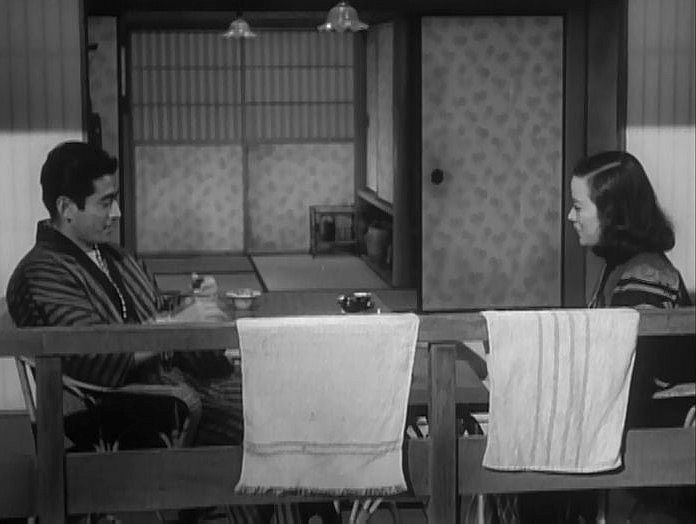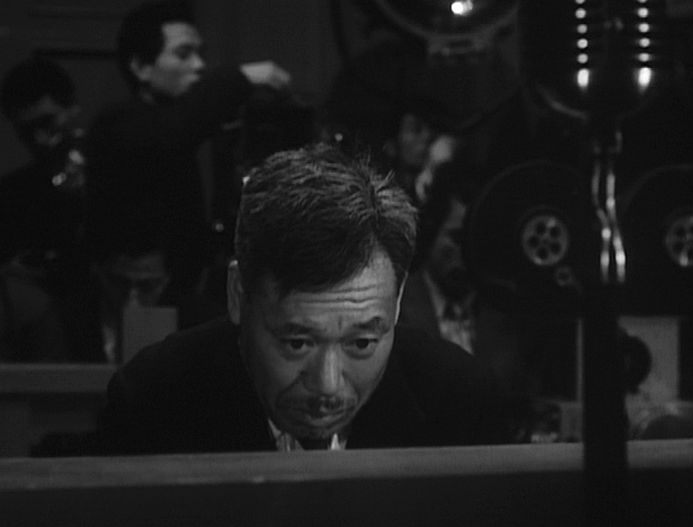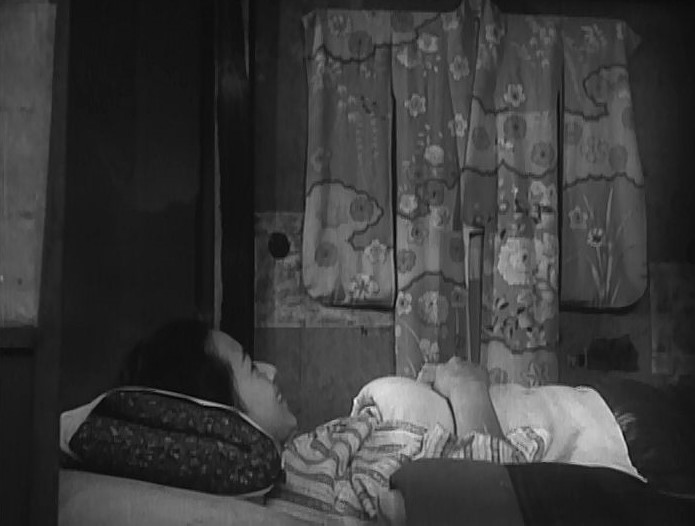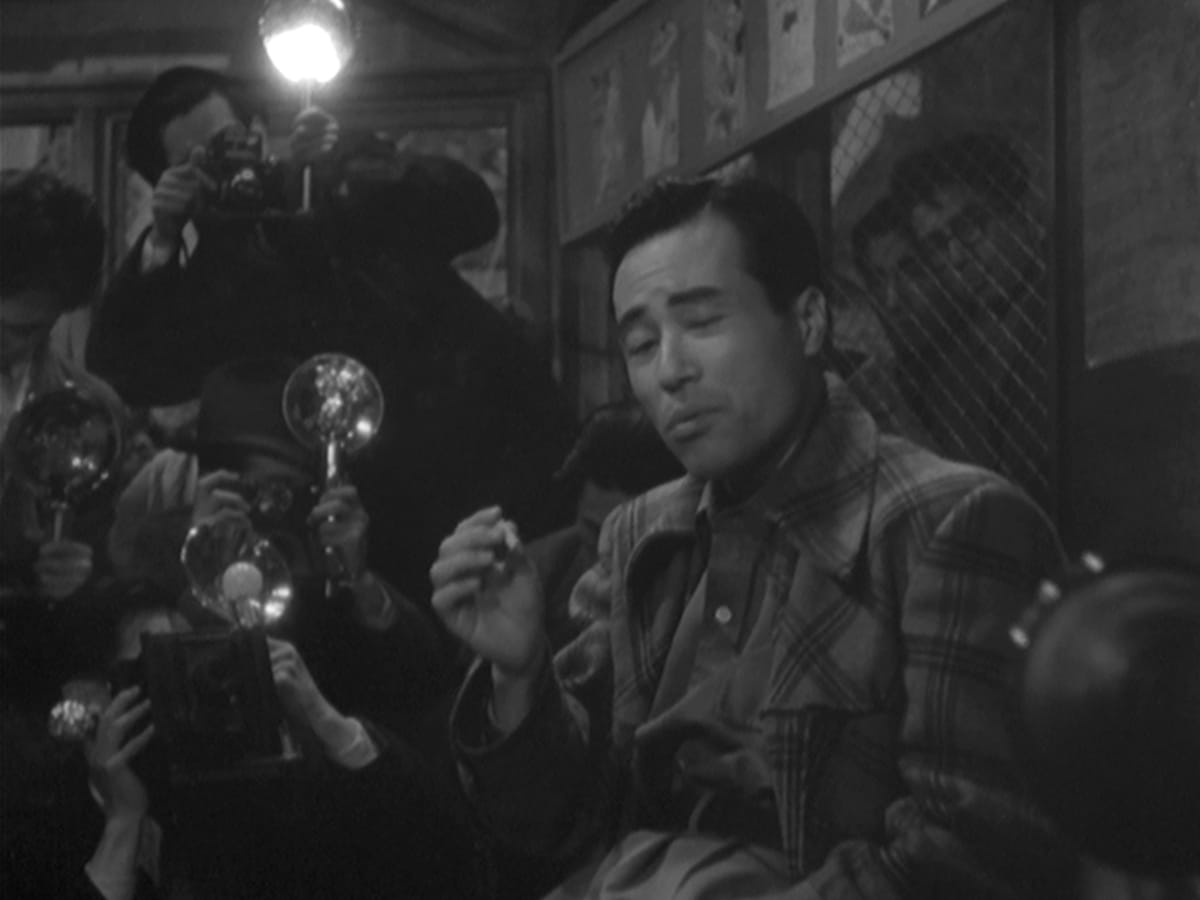In Akira Kurosawa’s Scandal (Sukyandaru, aka Shubun, 1950), the aspiring painter Ichiro Aoye (Toshiro Mifune) and the famous opera singer Miyako Saijo (Yoshiko Yamaguchi) become victims of the gutter press, with a magazine claiming that the two young people are lovers. A surreptitiously taken photo showing them together at an inn in the countryside is deliberately misinterpreted, and what was simply an ordinary conversation is presented as proof of a love affair. In the photo, they are both wearing a yukata (literally “bathing cloth”), a kind of dressing gown and a casual version of the kimono that is made of cotton or some other light fabric and generally provided by Japanese inns for their guests. This, together with the fact that their towels happen to hang side by side from a balcony, is considered proof of a secret affair, and the information given by the owner of the inn that his two guests arrived on Aoye’s motorbike is turned into headlines such as “Love on a motorbike” and “Passion on two wheels”.

From the very beginning, the viewer is aware of the truth, as the film’s opening sequence shows that Aoye and Saijo meet by chance in the countryside, where the painter gives the young woman a lift to the inn on his motorbike because she has missed the bus. Later, after each has taken a bath in the inn’s communal bathroom, they have a chat, and this proves fatal because two paparazzi who have been spying the famous singer in search of a story spot them sitting near an open window.
Tokyo is very quickly flooded by the picture on the cover of the magazine Amour showing the two protagonists at the inn, a picture that appears on the magazine’s publicity posters on hoardings and on buses. The French word “amour”, meaning love, is a suggestive title for the kind of sensational journalism Kurosawa deals with in his film. The article on Aoye and Saijo that is published is a complete fabrication, and Kurosawa reveals how the media invent the versions they want. The publisher Hori (Eitaro Ozawa) is depicted as an arrogant man whose perfidious smile underlines his cynical view of human beings, and he really believes in the image he has constructed of Saiyo based on his interpretation of the photograph: “I hate women who act innocent but turn out to be whores.”
For Hori, who knows about his readers’ thirst for scandalous stories, his own interpretation of reality becomes stronger than reality itself. Maintaining that he is printing “the complete unabashed truth”, he provokes Aoye, who reacts by hitting him in the face. And when he is sued by Aoye and Saijo, Hori counterattacks, claiming that the freedom of press is in danger, the conclusion being that for him artistic value is less important than the private lives of artists. Aoye, suddenly in the focus of public interest, complains about the behaviour of journalists: “They are looking for scandal even in my paintings.”
The notion of truth is at the very core of this film, which offers much more than criticism of the gutter press. After his Drunken Angel (Yoidore tenshi, 1948) and Stray Dog (Nora inu, 1949), Kurosawa’s Scandal gives another dark portrait of post-war Japan. The turkey served in the restaurant in the run-down neighbourhood in which the lawyer Hiruta (Takashi Shimura) lives is really chicken. Hiruta’s life is itself built on a lie – his office is a room in a wooden shack on the roof of a four-storey building, and the dog in the warning sign at the entrance to Hiruta’s home died long ago.

The name Hiruta can be translated as “leech field”, but this man, who sells his services to the two plaintiffs, Aoye and Saijo, and also to the defendant, the magazine Amour, is himself a victim and a man to be pitied – not mean but weak, as Aoye puts it. This characterization of Hiruta is underlined by Takashi Shimura’s magisterial portrayal and is well supported by the mise en scène. A corrupt lawyer, a drunkard and a gambler, he spends his money at keirin, Japanese cycle racing. When Hiruta is informed that the magazine has hired the famous lawyer Kataoka, he grabs his briefcase, his head lowered in a gesture anticipating defeat. During the trial he seems to shrink under Hori’s menacing gaze in an image of total dependence on the man who has bribed him.
Hiruta is a representative of those Japanese who had difficulty adapting to the rapid changes in Japan’s post-war society and a world ruled by egoism. He lives in a poor neighbourhood, still marked by the devastation of the recent war that has reduced much of Tokyo to rubble. The filthy sump that had already figured in Drunken Angel, its stagnant water filled with rubbish, is here once again a symbol of moral decay and a reference to the lethargy exhibited by many Japanese after the defeat in 1945.
Hori believes that the “snobs”, as he calls the celebrities that his magazine writes about, will not risk suing it. Aoye’s decision to take Amour to court shows that this prejudiced view does not apply to him. His firm attitude is an individual reaction, just as his motorbike is for him a symbol of freedom. His paintings, which are never shown but are discussed by other characters, are also an expression of Aoye’s desire for individuality. In the opening sequence, Aoye is painting a mountain landscape and is watched by three elderly forestry workers. When they remark that the mountains are not really red, although they are in his painting, Aoye explains: “I see brilliant red mountains inside me.”

Aoye paints what he feels and is outraged by the fact that critics regard his paintings as imitating the style of Maurice de Vlaminck. However, his individualism is never tinged with egoism, and by suing the magazine, he assumes civic responsibility and demonstrates his belief in modern advanced society, as he puts it. This remark fits the historical situation of post-war Japan as a nation transformed under the influence of values of democracy introduced by the American occupant (the occupation of Japan did not end until 1952). However, Scandal repeatedly reveals the dark side of this new society ruled by a desire for profit and by hypocrisy, which Hiruta refers to as “a confused era.”
Scandal is a reminder of the importance given to the freedom of speech in post-war Japan but points to the danger of abusing this right. But as well as presenting a critical view of the media, Scandal is a film about human feelings. The magazine Amour seeks out the more sensational aspects of a presumed love affair, implicitly suggesting its amoral side. However, Kurosawa also presents innocence and pure love, symbolized by Masako (Yoko Katsuragi), Hiruta’s daughter, a 13- or 14-year-old girl who is terminally ill with tuberculosis and close to death. Despite her sad situation, she is able to enjoy brief moments of happiness when Aoye offers her some apples or when she looks from her sickbed at the beautiful bridal kimono her mother has sewn for a client. Her sincerity impresses Aoye, who says: “She is a great child. One of God’s own children. As pure as a star.” And he concludes that the father of such a child cannot be completely mean.

Aoye has trust in the law. “Besides, we are innocent. How can we lose?” he says. But when it seems that the magazine will win the case, he starts to think that he might have put too much trust in the legal system. However, he does not completely lose faith in humanity. Hiruta confesses, after his daughter’s death, that he was bribed by Hori, and for Aoye this confession is proof of Hiruta’s fundamental goodness and evidence that his trust in this man – and in mankind – is not in vain.
Unlike Hori and the journalists, Aoye shows concern for other people. The human being does not matter to the media and one day’s headlines will be stale news and worthless the very next day. In the film’s last shots, Hiruta walks past the posters showing Aoye and Saijo, which have now been torn to shreds by wind and rain. Rather like the story about Aoye and Saijo, which has already been forgotten, Hiruta, moving with the crowd in the street, disappears from view. Although a film that celebrates human action and defends the importance of truth, Scandal ends on a bitter note about the power of the press and the state of Japanese society in the immediate post-war years.
